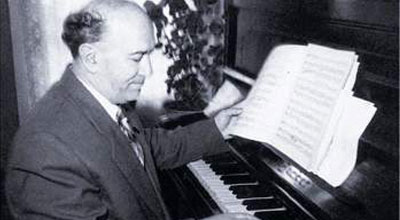Bulbul, Azerbaijani nightingale

By Laman Ismayilova
Azerbaijan's beautiful and ancient town Shusha has been always a source of pride. The cradle of Azerbaijani culture gave birth to the great number of outstanding poets, architects and musicians, including Kasim bey Zakir, Khurshid Banu Natevan, Khan Shushinski, Rashid Behbudov and many others.
The founder of Azerbaijan professional vocal school, skillful tasnif (ballad) performer and musician, Murtuza Mammadov was among such genius and extremely talented personalities.
The passion of music had never disappeared from his soul. In childhood, the musician often performed national folk song in front of listeners.
His imitation of the nightingale's song was so unique and smooth that people nicknamed him Bulbul.
The legendary tenor graduated from the Baku Conservatory in 1927 and continued education at the state line for 4 years in Milan (Italy). During this years, he got acquainted with creativity of outstanding Italian singers, who performed at one of the most famous opera stages in the world, La Scala.
Dark velvety voice and striking presence of the singer caught eyes of many foreign music lovers.
In 1931, the renowned magazine "Arte Nostra" magazine published an article about life and creativity of national 'nightingale'. Murtuza Mammadov received many invitations to give concerts in various parts of the world. He was awarded the "Stella di Garibaldi" order in Italy.
The his splendid voice inspired such major figures of Azerbaijani literature and art, as Samad Vurgun, Seyid Shushinski, Kurban Primov, Mehdi Mammadov and others.
Even to this day, his monographs serve as an important source for those studying Azerbaijani music. He was the first musician to publish study guides and manuals used in teaching students how to play the tar, kamancheh and balaban, traditional musical instruments of Azerbaijan.
Bulbul was the vocal performer and the co-author of a number of songs and romances. He took part in operas such as "Aleko", "Tosca", and "Rigoletto".
He was also first to play the lead role of Koroglu in Uzeyir Hajibeyov's opera of the same name in 1938. The opera was written specifically for his voice. Nobody after him had been able to repeat similar performance of the greatest opera. Therefore the part of Koroglu was decreased by one octave.
His music not only personifies the noble spirit but also helps the people to survive at tragic times, especially during the Great Patriotic War.
The singer's voice gave strength to the young Ukrainian soldier to undergo surgery without anesthesia.
Musician, who was able to blend folk songs and the vocal traditions of the West, as well as to create a completely new style of performance died in 1961, at the age of 64. He was buried at the Alley of Honor in Baku.
His son Polad Bulbuloglu followed his father's footsteps and also became famous Azerbaijani singer. The son of Azerbaijani nightingale became the Minister of Culture of Azerbaijan and is currently the Azerbaijani ambassador to Russia.
Following, the Armenian occupation of Shusha in 1992, the bronze bust of Bulbul along with other monuments was machine-gunned, removed from its original place and intended to be sold as scrap metal.
Nowadays these monuments are preserved in the courtyard of the Azerbaijani Museum of Arts in Baku.
---
Laman Ismayilova is AzerNews’ staff journalist, follow her on Twitter: @Lam_Ismayilova
Follow us on Twitter @AzerNewsAz
Here we are to serve you with news right now. It does not cost much, but worth your attention.
Choose to support open, independent, quality journalism and subscribe on a monthly basis.
By subscribing to our online newspaper, you can have full digital access to all news, analysis, and much more.
You can also follow AzerNEWS on Twitter @AzerNewsAz or Facebook @AzerNewsNewspaper
Thank you!
